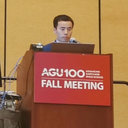
Jun XieBeijing Normal University | bnu · school of national safety and emergency management
Jun Xie
Doctor of Philosophy
About
10
Publications
3,587
Reads
How we measure 'reads'
A 'read' is counted each time someone views a publication summary (such as the title, abstract, and list of authors), clicks on a figure, or views or downloads the full-text. Learn more
126
Citations
Introduction
Jun Xie currently works at the Department of Geography, Environment and Earth Sciences, University of Hull. Jun does research in Geography, mainly focus on the landslides impact on landscape evolution.
Publications
Publications (10)
Experiments under controlled conditions have established that ecosystem functioning is generally positively related to levels of biodiversity, but it is unclear how widespread these effects are in real-world settings and whether they can be harnessed for ecosystem restoration. We used remote-sensing data from the first decade of a long-term, field-...
The 2008 Wenchuan earthquake triggered rapid local geomorphic changes, shifting abundant material through exogenic processes and generating vast amounts of loose material. The substantial material movement increased the geohazard (flash floods, landslides and debris flows) risks induced by extreme precipitation in the area. Intervention measures su...
Mass movements such as landslides are prominent sources of sediment in post-seismic mountain belts. Earthquake triggered landslides can generate substantial volumes of fresh sediment and this may have significant long-term (decade to millennium) geomorphic effects on landscape evolution. Downslope and downstream transport of sediment into the chann...
As evidenced by recent earthquakes in Chi-Chi, Wenchuan and Gorkha, seismic triggered landslides can have a major impact on river basins and landscape evolution. The location of landslides with respect to river channels plays an important role in post-earthquake sediment dynamics. As well as direct impacts such as damming rivers, the connectivity o...
Selective logging has been so extensive that harvested forest now exceeds unlogged areas in most tropical forest regions outside of the Amazon. In response, in Southeast Asia, enrichment planting with dipterocarp tree species is carried out in an attempt to accelerate restoration of forest structure and functioning. However, assessing the impacts o...
The 2008 Wenchuan Ms 8.0 earthquake caused severe destruction in the mountainous areas of Sichuan Province, China. Landslips and mass movements led to substantial amounts of loose sediment accumulating in valleys that subsequently led to widespread riverbed aggradation. In addition to erosion and deposition hazards, this aggradation produced rivers...
The 2008 Wenchuan Earthquake caused topographic change in the stricken areas because of the occurrence of numerous coseismic landslides. The emergence of new landslides and debris flows and movement of loose materials under the driving force of high rainfall could further shape the local topography. Currently, little attention has been paid to cont...
Detailed surface topography is important when analyzing the stability of slopes. Recent advances in new technologies such as interferometric synthetic aperture radar and light detection and ranging have allowed us to obtain high-precision profiles of distant landscapes and objects including detailed slope information for three-dimensional (3D) slop...





























